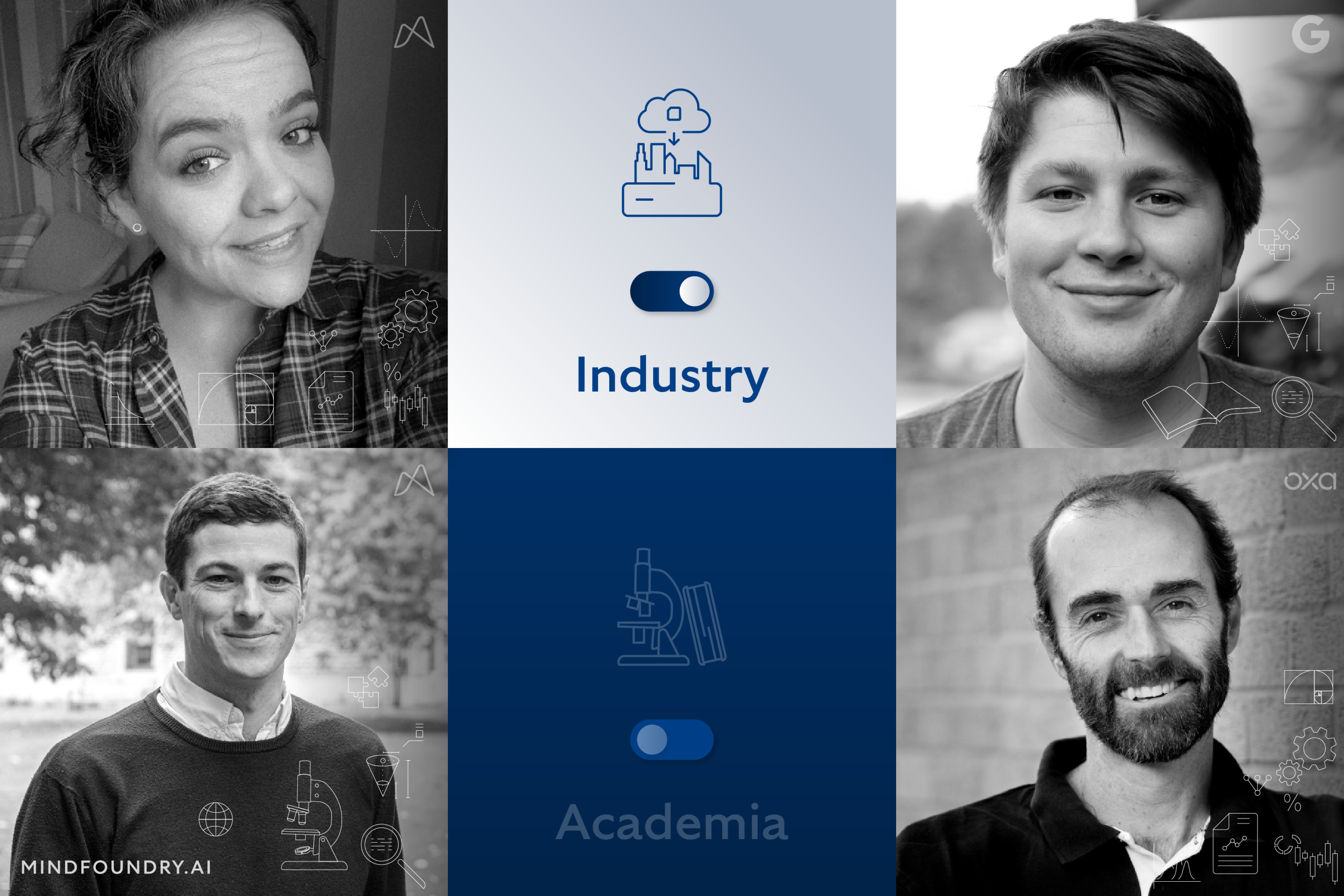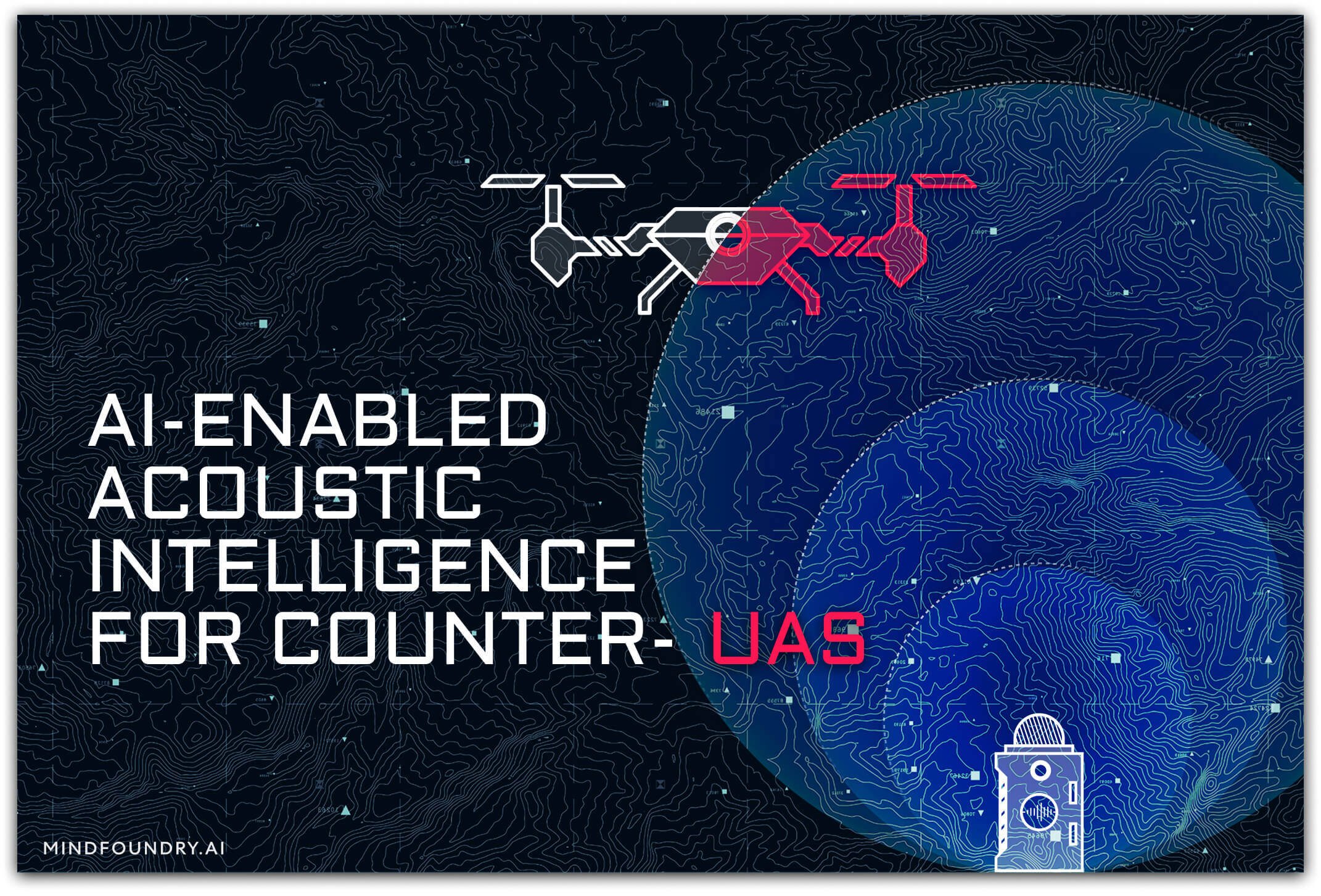AI-enabled Acoustic Intelligence for Counter-UAS
Unmanned Aircraft Systems (UAS) are now a staple of modern warfare, now responsible for 60% of targets destroyed in the Ukraine-Russia war....
9 min read
Mind Foundry
:
Jul 25, 2023 11:33:25 AM

Taking the leap from the world of academia to pursue a career within industry can be a daunting proposition. After years spent studying and gaining skills in a very focused area, going out into the world and applying that knowledge to a broad range of applications has a unique set of challenges. We interviewed members of the Mind Foundry, Google and Oxa teams, to understand their experience of making the leap from academia to industry, sharing their motivations, challenges, and the advice they would give to those making or considering a similar move.
Here are the people who kindly shared their experiences:
Owen Parsons
Owen is a Lead Machine Learning Scientist at Mind Foundry, with a PhD in cognitive neuroscience from The University of Cambridge. He works within the team responsible for creating innovative AI solutions for the Insurance sector, pushing the boundaries of where Machine Learning is used in business and research.
Jan Freyberg
Jan is a Machine Learning Software Engineer at Google. He gained his PhD at the University of Cambridge, researching the psychophysics of excitation and inhibition in autism before undertaking a fellowship program at Faculty AI, which helped him enter the Machine Learning industry.
Ben Upcroft
Ben is the VP of Technology at Oxa. He studied for his PhD in Physics at the University of Queensland and has been involved in field robotics research and teaching. Ben then joined the team at Oxa eight years ago to deploy autonomous systems worldwide.
Helen McKay
Helen is a Research Scientist at Mind Foundry, where she bridges the gap between original research and integrating complex AI software into industry-specific solutions. Helen gained her PhD at the University of Warwick, researching and tutoring machine learning and artificial intelligence and specialising in online machine learning approaches.
What has been your journey from academia to industry?
Owen: After finishing my PhD at The University of Cambridge in 2018, I started doing a short-term postdoc in the same lab to continue the research I’d been working on. I’d spent a lot of time learning about Machine Learning during my PhD, and towards the end of the postdoc, I began thinking more seriously about moving to industry. I had a lot of experience with programming as my academic background was in computational neuroscience, and through this, I discovered Machine Learning. While I had not extensively used Machine Learning during my PhD, I was interested in gaining more hands-on experience and believed that moving into the industry was the best way to do this.
Throughout my career so far, I’ve been lucky enough to learn and develop my skills further amongst some talented individuals, including Shimon Whiteson, a computer science professor at the University of Oxford.
Jan: After my PhD, I spent about 18 months in a postdoc at King's College, which involved much more programming than during my studies, and where I first started developing my software engineering skills. I then applied for a 10-week boot camp to study Machine Learning before joining a company to help with data analysis. This led me to a role in data science consultancy which is how I ultimately ended up in the Machine Learning industry.
Ben: My background is in physics, which I absolutely loved, but my work felt more like an academic investigation. I was interested in seeing instant, or at least quicker, validation of my work where the technology created could be used straight away. At the end of my PhD, I became interested in Robotics, Machine Learning, and Artificial Intelligence, so I decided to switch fields and go into Robotics. I was fortunate to work with the Australian Center for Field Robotics (ACFR) in Sydney, one of the largest field robotics groups in the world, creating intelligent machines that operate in the real world. This included developing the first automated port in Botany Bay and working on a project to understand the environmental, human, and social impact on the Great Barrier Reef using underwater vehicles for surveillance.
Then in 2016, an opportunity with Oxa came up (P.S. we’re hiring) to move further into autonomous vehicles, and I haven’t looked back since. I love growing a company from a very small number of people to a much larger one and delivering autonomous vehicles to any industry in any domain and environment around the world.
Helen: After completing my PhD in computer science, I was undecided about my next step. I loved the freedom of academia to focus on what I wanted to research, but working in industry seemed to be the better option for job stability. I began looking at research companies, but working for large tech companies didn’t appeal to me because I worried there may be fewer opportunities to influence the direction of research projects. I then came across Mind Foundry, and their work in continuous metalearning particularly caught my eye as it was heavily related to my PhD research.
Why did you decide to pursue a career in industry?
Owen: There is a lot of really interesting academic research, but with my slightly more diverse background in neuroscience and physics, I felt my skill set would be more valuable in industry. Alongside this, my wife became pregnant with our first child towards the end of my PhD. This was another motivation to look for something more stable because the typical postdoc positions that I was seeing tended to be quite short-term contracts.
Jan: During my studies, I found that, beyond the data analysis, there was actually a lot of work involved in recruiting participants for the experiments, getting them to the lab, and then running the experiments with them. This was something I enjoyed a lot less, and I couldn't see a way in the field that enabled me to focus solely on data analysis. Also, my postdoc was only on a six-month rolling contract, so working in industry offered much better job security.
Ben: My PhD was in experimental physics, and at the time, there was no application for it in the real world. My experience at ACFR allowed me to understand how to apply theories in industrial settings, and as an impatient person, industry allowed me to see the technology I created in action. The other motivation is that working in industry allows more in-depth discovery of technologies and the ability to develop a long-term vision of how to implement them. I wanted to go further in my understanding, and I was very interested in working collaboratively with people in one place to produce autonomous software.
Helen: One of the biggest things that drew me towards industry initially was job security. With a postdoc, you typically complete multiple research projects across different universities before securing a full-time position, and constantly moving between different institutions or countries did not appeal to me. Work-life balance is also very important to me, and I know many academics who are not able to take time off in the evenings or at weekends, and particularly for those with teaching and research roles, there is very little downtime.
Another factor that swayed me away from academia is how success is commonly measured. In a number of institutions, a good academic researcher is quantified by the number of papers you have published in top-ranked conferences. In Machine Learning, acceptance rates are commonly around 10%. This makes publishing challenging, and even with the best work, there are only finite spaces within these academic journals and conferences. Unfortunately, this can lead to rejection cycles that, at times, can be demoralising.
What challenges have you faced when moving from academia to industry?
Owen: For me, a lot of the challenges I faced were around the pace of work, as in academia, the pace tends to be a lot slower. There is still pressure to get work done, but deadlines are more flexible as you often work independently to design experiments and collect and analyse results. However, in industry you tend to work across multiple teams, supporting other individuals and working collaboratively to meet hard deadlines.
The other challenge I faced was developing my software engineering skills. I’m a self-taught programmer and had done a lot of coding during my PhD, but there was definitely a step up in standards when I moved to industry. I focused a lot on learning to write cleaner and more efficient code whilst gaining a deeper understanding of algorithms and data structures. It was a challenge, but one that I really enjoyed.
Jan: The language and communication styles used in industry differ greatly from academia. In industry, things happen a lot faster, so you need to be able to communicate quicker, and the jargon used was something that I found challenging. The boot camp helped with this as they explored how to communicate the results of data science projects in an industry setting.
Ben: Working in industry, particularly for a start-up, you must learn how to build. In every technology company, I see two factors - the technology and the humans who enable the technology and will grow as you continue to scale. Humans must continue working together to ensure they are aligned and pointed in the right direction, which I hadn’t anticipated would be challenging. It isn’t just the technology but the growth of people, relationship building, and the different ways people work together - a challenge for sure but a very exciting one.
Helen: The biggest adjustment for me was that I initially missed the autonomy of academia and the scope of research. I liked the independence of being able to define the scope of my own research, whereas, in industry, there is a collaborative goal you are working towards. That being said, there is scope for suggesting new project ideas and carrying these out in industry, especially at Mind Foundry, but generally, this is less frequent and a little more restrictive than in academia. The type of research I do in industry is also different to what I did in academia because the research in industry is more product-focused and considerably faster-paced. This has meant that there are aspects of research that I haven’t been able to go as in-depth as I would have if I had approached the problem in academia. However, one of the benefits of doing research in industry is the availability of real-world data. This allows us to use machine learning to solve real-world problems, whereas the accessibility of real-world data in academia is always a challenge.
What surprised you about the differences between working within academia and industry?
Owen: The main thing that surprised me, which may differ across organisations, was the number of similarities between academia and industry. I expected to miss the learning experiences, but in all the companies I have worked for, especially Mind Foundry, they prioritise learning and development. Spending time developing areas you think are important, even if it's not a high priority for the company, is encouraged. Things like journal clubs and study groups are great ways to learn and share knowledge of new techniques and methods.
Jan: One thing that surprised me was how academia and industry are not completely dissimilar. People often worry that in industry, you are asked to produce results, match people's preconceptions, and reinforce something they already think. However, I have yet to experience this personally, which was a pleasant surprise.
Ben: I don't think there is a difference between academia and industry, but the difference between academia and a startup moving into a scale-up is that the technology only gets you some of the way. I was surprised how ‘wrapping up’ technology into a product involves various diverse skills to create, market, and commercialise such a product. As an academic, I had the misconception that everything falls into place if you’ve got the right technology. But there is a lot more to it than that. I was surprised by how much weight was put on the other parts beyond technology; this discovery was interesting for me.
Helen: One of my reservations about moving away from academia was that I thought my role would be very repetitive, but this is not the case. There is so much scope to learn new things, and every day is different. Especially for someone from an academic background, learning is so important, which drives many people to stay in academia and continue with PhDs or postdocs. The project turnaround times also surprised me, as I imagined that I would be focusing on projects for a long period of time, but in reality, most of our projects at Mind Foundry turn around in three to six months. This exposes you to many different problems, which can all be different research problems. You can also see that what you are doing is actually making a difference, which is one of the main benefits of being in industry.
What advice would you give someone considering moving from academia to industry?
Owen: Be flexible about your first role. I wanted to do something with Machine Learning and work on deep learning models, but I knew I needed more experience first. My first industry role was as a Data Scientist rather than a Machine Learning Engineer. Using my prior experience in this area helped me get a foot in the door, which opened up further opportunities to explore the areas I was really interested in.
I would also say that turning what you may perceive as a weakness into a strength (in my case, my varied background in programming, computational neuroscience, cognitive psychology, and physics) is a valuable skill. I initially felt disadvantaged because my background didn’t have a single area of focus, but I soon discovered that companies often value having people with broader skill sets who can sit across a few different areas rather than just being an expert in one field.
Jan: Academic roles are so diverse, so I suggest looking at your current role in academia, figuring out what you enjoy about it, and then finding a place in industry that matches your interests. There are so many different roles in industry, so you can definitely find something that matches that.
Ben: Don’t be afraid to lean on your network; use them for help and advice. Working for a start-up is one of the most exciting things I've ever done and, at the same time, some of the hardest work. It is often more of a lifestyle, as you need that kind of dedication to ensure its success. You learn many things that you wouldn't have learnt as an academic, and if you're interested in continuous learning, lifelong learning, I think this is very worthwhile and super rewarding.
Helen: I still firmly believe there's nothing quite like academia, especially if you're going down the route of both research and teaching. If that's your passion, and it has to be your passion, because they're overworked and underpaid, nothing will suggest that industry is better. But there are a lot of opportunities in industry for research, learning new things, applying what you know to do something useful, and job stability. These are all great advantages of working in industry.
Although navigating the landscape of the transition from academia and research to practical work in industry is rarely straightforward, the individuals whose testimonies you have just read show that not only is it possible, it can be incredibly successful, rewarding, and exciting. We hope that reading about their experience answers some of the questions you may have and gives you a better idea of what to expect on your own journeys. Good luck!

Unmanned Aircraft Systems (UAS) are now a staple of modern warfare, now responsible for 60% of targets destroyed in the Ukraine-Russia war....

In Defence and National Security, mission-critical data often emerges from a multitude of different sensor types. With AI, we can bring this...

When used by malicious actors or without considerations for transparency and responsibility, AI poses significant risks. Mind Foundry is working with...